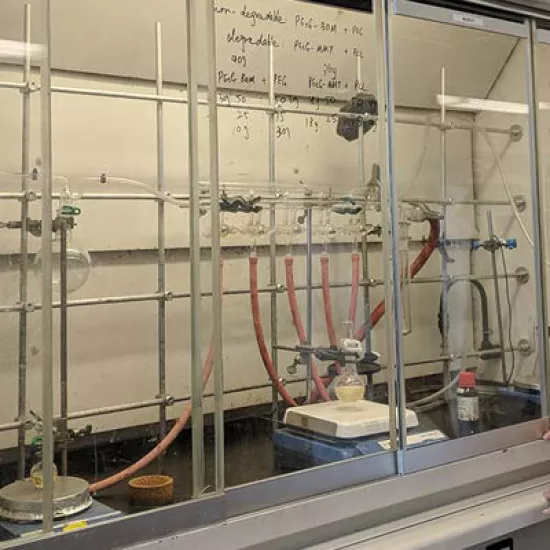
Biological Chemistry
Biological Chemistry deals with the chemical processes of and relating to living organisms. The program, with its solid core of chemistry, plus the required biology and biochemistry courses, provides an interesting and challenging interdisciplinary study experience. Biological Chemistry examines nature at the molecular level by using a combination of synthetic, inorganic, analytical and physical chemistry as well as the tools of molecular biology. This program provides the context to understand the chemical reactions and interactions that occur in biological processes, as well as how chemical strategies can be used to control these systems. Students graduating from this program will be prepared for career paths in the biotechnology, biomedical and pharmaceutical sectors, as well as for research and teaching in related areas of chemistry and biology.
Honours Bachelor of Science
Program Plans
Plan your degree with these academic and co-curricular program overviews.
Tip Sheets
Learn more about further education, applying to jobs & more!
- Molecular Biologist
- Epidemiologist
- Medical Doctor
- Geochemist
- Forensic Laboratory Analyst
Admission Requirements
Regional Requirements
Admissions RequirementsLife in Biological Chemistry
Buzz Around Campus
Sample Courses
An introduction to the molecular biology of the cell with an emphasis on similarities and differences between prokaryotic and eukaryotic cells.
The chemistry of selected classes of naturally occurring molecules such as those below, with emphasis on structure, stereochemistry, properties and synthesis.
An introduction to drug discovery, design and development. This course will focus on the potential of proteins (enzymes, receptors, receptor structure and signal transduction) as targets for molecular therapeutic intervention.
Other Programs to Consider

Chemistry
Chemistry plays a vital and well-integrated role in many areas of scientific discovery, including the development of new drugs, materials and diagnostics. Advancements made in the field of chemistry have brought improvements to our quality of life, and will help us to control the impact we are making on our environment in order to form the basis for a strong economy.

Environmental Science
Environmental Science is an interdisciplinary study of complex environmental problems involving the natural world and human impacts. Students can tailor the scientific focus of the program to their own interests, by choosing courses from Geographical and Earth Science perspectives; Biological/Ecological perspectives; and Physical/Chemical perspectives. Courses on Social and Policy perspectives are also part of the program; no matter which pathway is followed, some courses on Social and Policy Perspectives are required.

Geography (HBSc)
The Geography BSc offers a broad perspective on physical geography. In-depth studies include climatology, hydrology and ecosystems, with possible specialization in biogeochemistry, arctic regions, landscape ecology, natural resources and urban climate. The curriculum stresses the integrative nature of the discipline as well as the development of skills in geographical information analysis.



